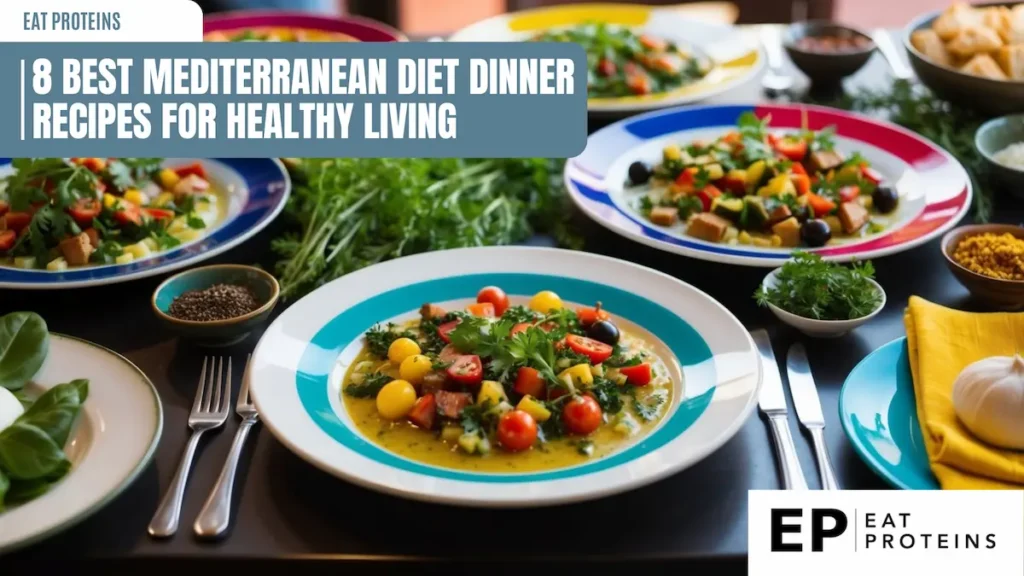
The Mediterranean diet is known for its delicious flavors and health benefits. With an emphasis on fresh ingredients, healthy fats, and lean proteins, it’s no wonder that many people are turning to this style of eating. I believe that exploring the best dinner recipes from this diet can inspire anyone to enjoy healthier meals without sacrificing taste.
In this article, I will share eight of my favorite Mediterranean dinner recipes that are both simple to prepare and satisfying. From rich, hearty dishes to lighter fare, these recipes offer a variety of options to suit different preferences. I hope these meals will encourage you to embrace the Mediterranean way of eating and bring joy to your dining table.
1. Grilled Chicken Souvlaki

Grilled Chicken Souvlaki is a popular Greek dish made from marinated chicken, skewered and grilled to perfection. It is flavorful and packed with protein, making it a great option for dinner.
I find this recipe easy to prepare. With just a few ingredients, I can create a delicious meal in under 30 minutes.
To make Grilled Chicken Souvlaki, I follow these simple steps:
- Cut 1 pound of chicken breast into cubed pieces.
- Prepare a marinade using 2 tablespoons of olive oil, the juice of 1 lemon, 2 minced garlic cloves, and a teaspoon each of oregano and salt.
- Combine the chicken with the marinade in a bowl. Let it sit for at least 15 minutes to soak up the flavor.
- Thread the chicken onto skewers.
- Preheat the grill to medium-high heat and cook the skewers for 10-15 minutes, turning occasionally, until the chicken is cooked through.
I love serving my Souvlaki with pita bread and a side of tzatziki sauce for dipping.
2. Stuffed Bell Peppers with Quinoa and Feta

Stuffed bell peppers with quinoa and feta are a tasty and healthy option in the Mediterranean diet. They combine colorful bell peppers with nutritious quinoa and flavorful feta cheese. This dish is also simple to prepare.
To make this recipe, I first gather my ingredients. I need bell peppers, cooked quinoa, feta cheese, olive oil, and spices.
Here are the steps I follow:
- Preheat my oven to 375°F (190°C).
- Cut the tops off the bell peppers and remove the seeds.
- In a bowl, mix cooked quinoa, crumbled feta, and my choice of spices.
- Stuff the mixture into the bell peppers.
- Drizzle olive oil over the peppers and place them in a baking dish.
- Bake for 25-30 minutes until the peppers are tender.
This dish is not only easy to make but also packed with flavor and nutrients. It’s a great option for dinner and can be served warm or at room temperature. I enjoy making this recipe for family or friends.
3. Baked Cod with Tomatoes and Olives
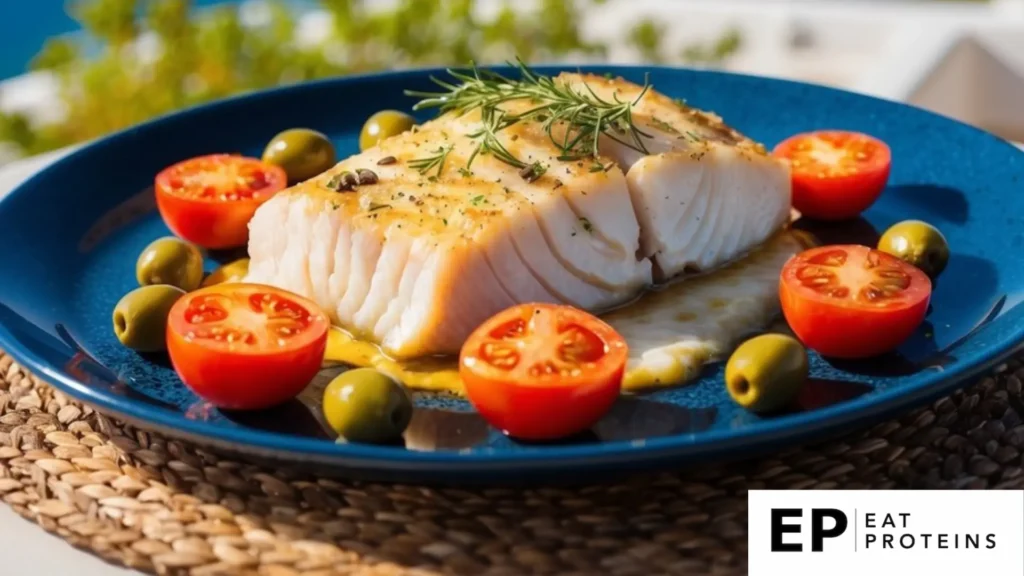
Baked Cod with Tomatoes and Olives is a simple and flavorful dish. Cod is a mild white fish that pairs well with the tangy taste of tomatoes and the briny flavor of olives.
I find this recipe easy to prepare and perfect for a weeknight dinner. It takes about 30 minutes from start to finish.
Here are the steps I follow:
- Preheat the oven to 400°F (200°C).
- In a baking dish, combine 2 cups of diced tomatoes and 1 cup of olives.
- Place two cod fillets on top of the tomato mixture.
- Drizzle with 2 tablespoons of olive oil and season with salt, pepper, and herbs of choice.
- Bake for 20 minutes, until the fish is flaky and cooked through.
This dish is not only quick to make but also packed with healthy ingredients. The combination of fish, tomatoes, and olives provides essential nutrients. Enjoy this meal with a side of whole grain or a fresh salad for a complete dinner.
4. Lamb and Chickpea Stew
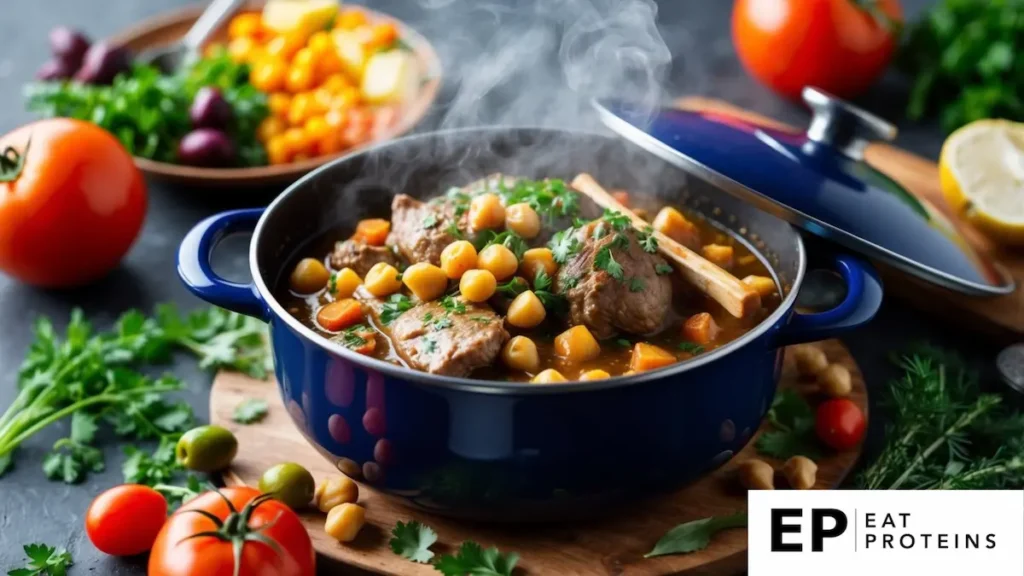
Lamb and chickpea stew is a hearty and nutritious dish. It combines tender lamb with protein-rich chickpeas, making it filling and satisfying. This stew is easy to prepare and perfect for weeknight dinners.
To make this dish, I follow these simple steps:
- Start by browning 1 pound of cubed lamb in a pot over medium heat for about 5 minutes.
- Add 1 chopped onion, 2 minced garlic cloves, and 1 diced carrot. Cook for another 5 minutes until the vegetables soften.
- Stir in 1 can of diced tomatoes, 1 can of rinsed chickpeas, and 2 cups of vegetable broth.
- Season with 1 teaspoon of cumin, 1 teaspoon of paprika, salt, and pepper to taste.
- Bring the mixture to a boil, then reduce the heat and simmer for 30 minutes.
This stew is rich in flavors and very easy to make. I enjoy serving it with crusty bread or rice to soak up the delicious broth. It’s a wonderful addition to any Mediterranean diet.
5. Spiced Lentil Soup
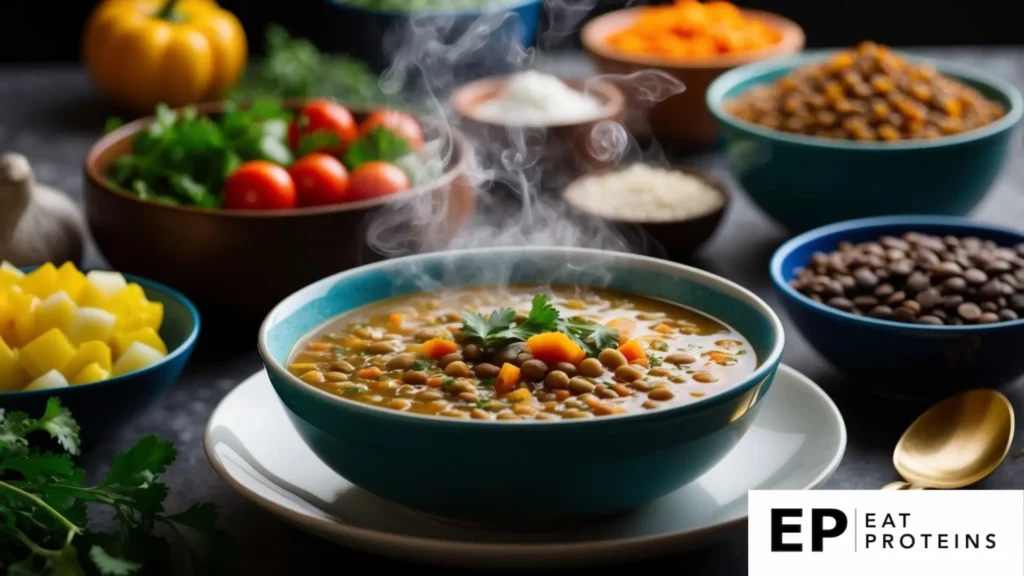
Spiced Lentil Soup is a hearty and nutritious dish that showcases the flavors of the Mediterranean diet. Lentils are an excellent source of protein and fiber, making this soup both filling and healthy.
I find it easy to make this soup with a few simple ingredients. It usually takes about 30-40 minutes from start to finish.
Here are the basic steps:
- Sauté Aromatics: In a pot, heat olive oil and sauté chopped onions, garlic, and carrots for about 5 minutes until soft.
- Add Spices: Stir in spices like cumin, coriander, and turmeric. Cook for 1-2 minutes to release their flavors.
- Combine Lentils: Add rinsed lentils and vegetable broth. Bring to a boil, then reduce heat and simmer for 20-25 minutes or until the lentils are tender.
- Finish and Serve: Blend the soup slightly for a creamier texture if desired. Adjust seasoning with salt and pepper before serving.
This Spiced Lentil Soup is satisfying and perfect for any night of the week, offering a taste of the Mediterranean in every bowl.
6. Mediterranean Eggplant Lasagna
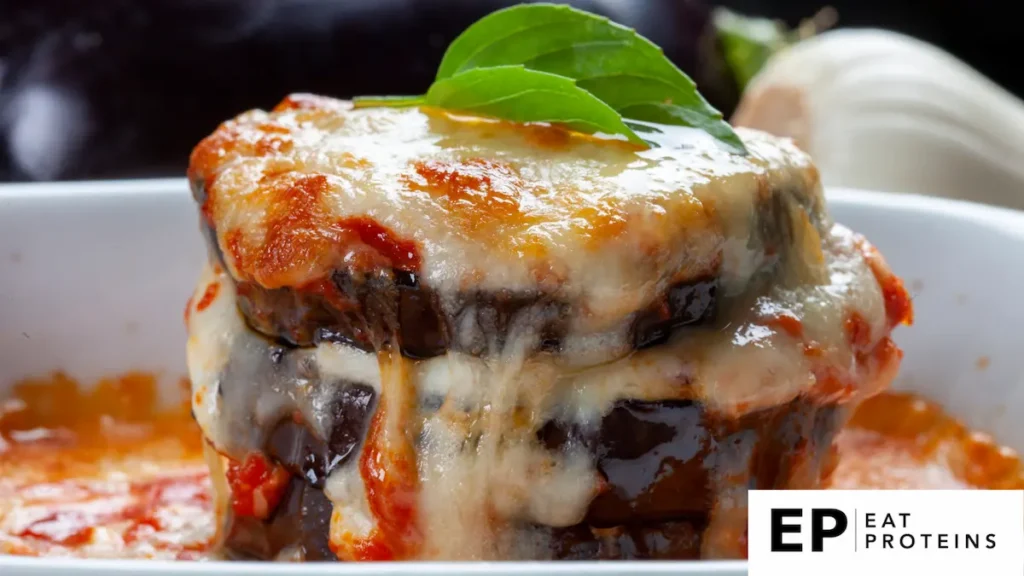
Mediterranean Eggplant Lasagna is a healthy twist on the classic dish. Instead of pasta, I use sliced eggplant, making it lower in carbohydrates and packed with nutrients. It’s a delicious way to enjoy the flavors of the Mediterranean diet.
Making this dish is quite easy. First, I slice the eggplant and sprinkle it with salt to draw out excess moisture. I let it sit for about 30 minutes.
Next, I rinse and pat dry the eggplant. Then, I layer it with marinara sauce, ricotta cheese, spinach, and mozzarella in a baking dish. I repeat the layers until the dish is full.
For cooking, I preheat the oven to 375°F (190°C). I cover the lasagna with foil and bake it for 30 minutes. After that, I remove the foil and bake for an additional 15 minutes until the cheese is bubbly and golden.
Once cooked, I let it cool for a few minutes before slicing. This dish can be served warm and pairs well with a side salad. It’s a great meal for family dinners or meal prep for the week.
7. Shrimp and Couscous Salad
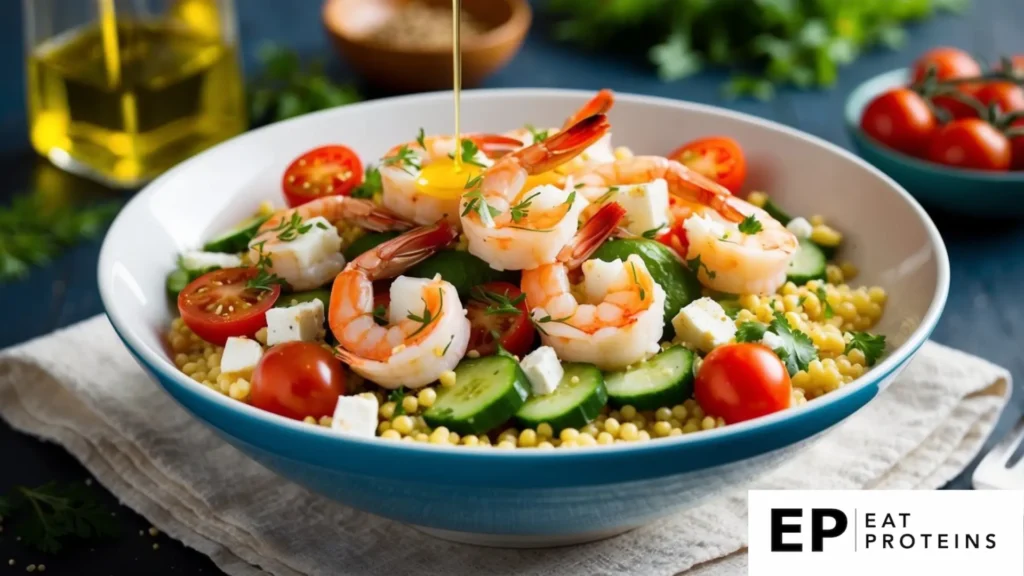
Shrimp and couscous salad is a fresh and light dish that fits well in the Mediterranean diet. It combines cooked shrimp, fluffy couscous, and colorful vegetables for a nutritious meal.
I find this recipe easy to prepare. It usually takes about 30 minutes from start to finish. Here’s how I make it:
- Cook 1 cup of couscous according to package instructions.
- In a skillet, heat 1 tablespoon of olive oil over medium heat.
- Add ½ pound of peeled shrimp and cook for about 3-4 minutes until pink.
- Chop 1 cup of bell peppers, ½ cup of cucumber, and ¼ cup of red onion.
- Mix the cooked couscous, shrimp, and chopped veggies in a large bowl.
- Add juice from 1 lemon, salt, and pepper to taste.
- Toss everything together and serve chilled or at room temperature.
This salad offers a blend of flavors and textures. It is satisfying and healthy, making it a great choice for dinner or lunch.
8. Spinach and Feta Stuffed Chicken Breasts
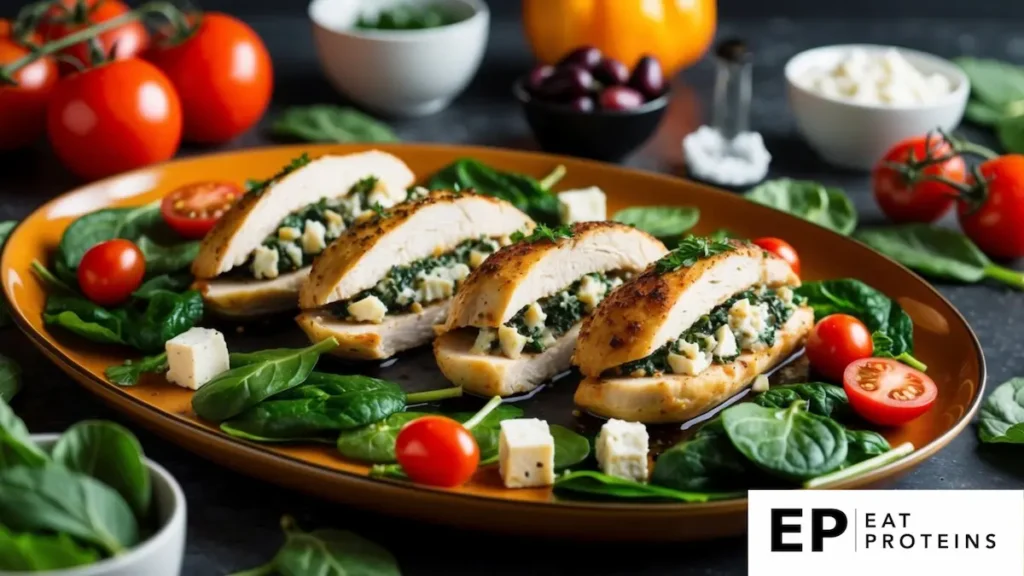
Spinach and feta stuffed chicken breasts are a delicious option for dinner. This recipe combines tender chicken with healthy spinach and creamy feta cheese. It offers a great way to enjoy flavors from the Mediterranean.
Making this dish is quite easy. First, I prepare the filling by mixing cooked spinach with crumbled feta, garlic, and herbs. This combination creates a tasty and nutritious filling.
To cook the chicken, I follow these steps:
- Preheat the oven to 375°F (190°C).
- Take boneless chicken breasts and make a pocket in each one.
- Stuff the pockets with the spinach and feta mixture.
- Season the outside of the chicken with salt, pepper, and olive oil.
- Place the chicken in a baking dish and bake for 25-30 minutes.
This dish is not only simple but also packed with protein and nutrients. It’s a satisfying main course that pairs well with a side salad or roasted vegetables. Enjoying this recipe brings a taste of the Mediterranean right to my table.
What Are the Health Benefits of the Mediterranean Diet?
The Mediterranean diet is known for its many health benefits. It supports heart health, aids in weight management, and may increase longevity. These aspects make it a popular choice for those looking to improve their overall well-being.
How Does the Mediterranean Diet Improve Heart Health?
I find that the Mediterranean diet is great for heart health. It emphasizes foods rich in healthy fats, like olive oil and nuts. These fats can help lower bad cholesterol levels.
In addition, I include plenty of fruits and vegetables, which are high in antioxidants. These foods combat inflammation and help keep blood vessels healthy. Eating fish, especially fatty fish like salmon, provides omega-3 fatty acids that also support heart function.
A study shows that people following this diet have a lower risk of heart disease. They tend to have better blood pressure and a healthier weight, too. This diet is not just tasty; it promotes a healthy heart.
How Does the Mediterranean Diet Help with Weight Management?
When I follow the Mediterranean diet, I notice it helps with weight management. The focus on whole foods like grains, legumes, and vegetables keeps me full. These foods are lower in calories compared to processed options.
Portion sizes are key in this diet. I can enjoy my meals without feeling deprived. Healthy fats like those found in avocados and olive oil contribute to satiety, making it easier to stick to portion control.
I also appreciate that this diet does not require strict calorie counting. Instead, it promotes joyful eating with nutritious ingredients, which makes it sustainable. This balance encourages me to maintain a healthy weight over the long term.
How Does the Mediterranean Diet Contribute to Longevity?
Research suggests that the Mediterranean diet may promote longevity. Many studies show that people who eat this way often live longer lives. The combination of nutrient-rich foods is powerful.
This diet is full of anti-inflammatory ingredients that may reduce the risk of chronic diseases. Eating lots of vegetables, fruits, and fish can help maintain health as I age.
Social eating is another aspect I enjoy. Sharing meals with family and friends can improve emotional well-being. Together, these factors support a longer, healthier life.
What Are the Key Ingredients in Mediterranean Cuisine?
Mediterranean cuisine is known for its emphasis on fresh, quality ingredients. These key components not only enhance flavor but also provide various health benefits. Understanding the essential ingredients can help me make delicious and authentic dishes.
How Is Olive Oil Used in the Mediterranean Diet?
Olive oil is a fundamental part of Mediterranean cooking. I use extra virgin olive oil for its rich flavor and health benefits. This oil is high in monounsaturated fats, which can help lower bad cholesterol levels.
In my kitchen, olive oil is versatile. I use it for sautéing vegetables, drizzling over salads, or as a base for marinades. It enhances the taste of dishes while providing essential nutrients, including vitamin E and antioxidants.
When choosing olive oil, I look for one labeled “extra virgin” to ensure it is of high quality. The flavor can vary depending on the type of olives used and the region where it’s produced.
What Role Do Whole Grains Play in the Mediterranean Diet?
Whole grains are another key element in Mediterranean eating. They provide fiber and essential nutrients, making meals satisfying and healthy. Common whole grains include quinoa, farro, and barley.
In my recipes, I often choose dishes that highlight whole grains. They serve as a great base for salads or side dishes. Whole grains also help to maintain steady energy levels due to their slow digestion.
I prefer cooking whole grains in vegetable broth to add flavor. This small change transforms a simple grain into a tasty and nutritious part of my meal.
How Are Fresh Vegetables and Fruits Incorporated into the Mediterranean Diet?
Fresh vegetables and fruits are the stars of Mediterranean cuisine. They add color, flavor, and nutrition to my meals. I often use ingredients like tomatoes, cucumbers, bell peppers, and zucchini.
In addition to their vibrant taste, these foods are packed with vitamins and minerals. Eating a variety of vegetables and fruits can help support overall health. I aim to include seasonal produce for the best flavor and freshness.
I enjoy incorporating these ingredients in salads, stews, and roasted dishes. Their natural flavors shine through when prepared simply, allowing me to appreciate the taste of each component.
